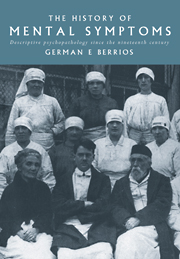Book contents
- Frontmatter
- Contents
- PREFACE
- ACKNOWLEDGEMENTS
- INTRODUCTION
- PART I The object of inquiry
- PART II Cognition and consciousness
- CHAPTER 3 Disorders of perception
- CHAPTER 4 Thought disorder
- CHAPTER 5 Delusions
- CHAPTER 6 Obsessions and compulsions
- CHAPTER 7 Mental Retardation
- CHAPTER 8 Cognitive impairment
- CHAPTER 9 Memory and its disorders
- CHAPTER 10 Consciousness and its disorders
- PART III Mood and emotions
- PART IV Volition and action
- PART V Miscellany
- REFERENCES
- NAME INDEX
- SUBJECT INDEX
CHAPTER 7 - Mental Retardation
from PART II - Cognition and consciousness
Published online by Cambridge University Press: 08 January 2010
- Frontmatter
- Contents
- PREFACE
- ACKNOWLEDGEMENTS
- INTRODUCTION
- PART I The object of inquiry
- PART II Cognition and consciousness
- CHAPTER 3 Disorders of perception
- CHAPTER 4 Thought disorder
- CHAPTER 5 Delusions
- CHAPTER 6 Obsessions and compulsions
- CHAPTER 7 Mental Retardation
- CHAPTER 8 Cognitive impairment
- CHAPTER 9 Memory and its disorders
- CHAPTER 10 Consciousness and its disorders
- PART III Mood and emotions
- PART IV Volition and action
- PART V Miscellany
- REFERENCES
- NAME INDEX
- SUBJECT INDEX
Summary
Although the idea that human beings have mental capacities to ‘read into’ (intus-legere) the nature of things is old, the concept of intelligence as a psychological function is new. In earlier days, intellectual powers were not clearly differentiated from other mental faculties such as perception, emotions and will, nor from other information gathering mechanisms such as intuition or conjecture. Understanding is considered by Plato as superior to belief and conjecture, and by Aristotle as depending upon the capture of the ‘form’ of the object in question: ‘Now, if thinking is akin to perceiving, it would be either being affected in some way by the object of thought or something else of this kind. It must then be unaffected but capable of receiving the form, and potentially such as it, although not identical with it; and as that which is capable of perceiving is to the objects of perception, so must be the intellect similar to its objects’. ‘And I speak of as intellect that by which the soul thinks and supposes.’ Galen suggested that the active intelligence operated by means of mechanisms such as distinction, combination, solution, demonstration, enumeration, and classification. For Aquinas, intellect is the function of ‘apprehending something’ and has two components: an intelligence for simple ideas and another for ‘complex understanding.’
This general conception of understanding or intelligence lasted well into the eighteenth century and can be found in Kant: ‘if the power of knowledge in general is to be called understanding (in the most general sense of the term), understanding must include: 1. the power of apprehending, 2. the power of abstracting, and 3. The power of reflecting.’
- Type
- Chapter
- Information
- The History of Mental SymptomsDescriptive Psychopathology since the Nineteenth Century, pp. 157 - 171Publisher: Cambridge University PressPrint publication year: 1996



